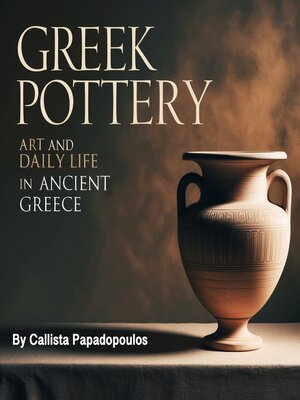Greek Pottery
audiobook (Unabridged) ∣ Art and Daily Life in Ancient Greece
By Callista Papadopoulos

Sign up to save your library
With an OverDrive account, you can save your favorite libraries for at-a-glance information about availability. Find out more about OverDrive accounts.
Find this title in Libby, the library reading app by OverDrive.



Search for a digital library with this title
Title found at these libraries:
| Library Name | Distance |
|---|---|
| Loading... |
This audiobook is narrated by a digital voice.
The story of Greek pottery begins with the fundamental human need to store, transport, and serve food and liquids, yet through the genius of Greek craftsmen and artists, these utilitarian objects were transformed into some of the finest artistic achievements of the ancient world, providing modern observers with invaluable insights into Greek society, religion, mythology, and daily life while also establishing technical and aesthetic standards that would influence ceramic production throughout the Mediterranean basin and beyond. The evolution of Greek pottery from simple handmade vessels to sophisticated works of art reflects the broader development of Greek civilization itself, as increasing prosperity, cultural sophistication, and technological innovation enabled potters to devote greater attention to aesthetic refinement and artistic expression.
The earliest Greek pottery emerged from the collapse of Mycenaean civilization during the Dark Age of the eleventh and tenth centuries BCE, when the sophisticated palace-based ceramic traditions of the Bronze Age gave way to simpler forms and decorative schemes that reflected the reduced circumstances and cultural discontinuity that characterized this transitional period. The Protogeometric style that developed during this time featured basic geometric patterns executed with compass and ruler that demonstrated renewed interest in systematic decoration while also revealing the mathematical sensibilities that would become characteristic of later Greek artistic achievement.







